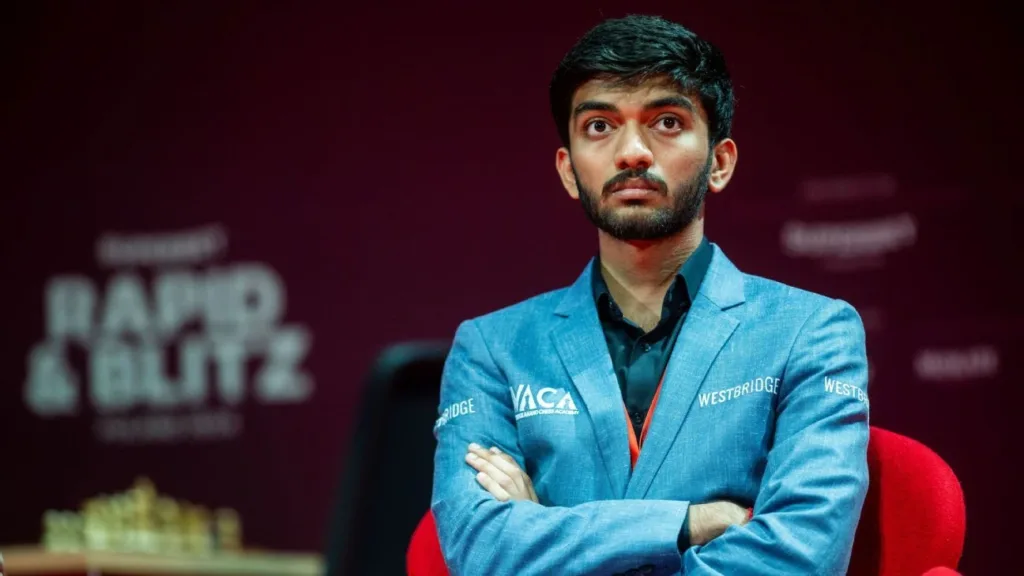In November 2024, Gukesh Dommaraju etched his name in chess history, becoming the youngest World Champion the game has ever seen. But behind the title lies a story of relentless preparation, a team united by purpose, and a mindset honed as much by yoga as by opening novelties.
Building a Champion
For Gukesh, the journey from challenger to champion was not about one magical moment.
“It wasn’t one single thing, but a combination of factors,” he says. “The support from my parents and my team was crucial. We worked incredibly hard for six or seven months between when I qualified in April and the match in November. This period of intense work helped me grow a lot, both as a chess player and as a person.”
That growth was fueled by a team largely based in Poland. “Last year, I probably spent more time in Warsaw than I did in Chennai,” Gukesh laughs. His head trainer, Polish Grandmaster Grzegorz Gajewski, has guided him since 2023. “He helped me go from a strong 2700-rated grandmaster to a top-10 player and eventually the World Champion.”
Mastering the Mind
Mistakes are inevitable, even for the world’s best. Gukesh has learned to accept them with composure. “Sometimes you just can’t help making a mistake. You have to accept it and focus on the present moment. The more you can do that, the better you get at handling them.”
This calmness wasn’t always part of his personality. “I used to be impulsive and short-tempered. If I lost one game, it would affect the next,” he admits. The turning point came when he began practicing meditation and basic yoga. “I’m not advanced in yoga. I just do simple movements and focus on breathing from the stomach. It helps me stay relaxed.”
Training in the Age of AI
Like all top players, Gukesh trains with AI-powered engines. “There’s no comparison between humans and computers,” he says. “A human Grandmaster might be around 2800, but a computer is around 3500. Since AlphaZero and Leela came along in 2018, the way chess players think has changed a lot. AI is a huge part of modern chess.”
Beyond the Title
Winning the crown brought prestige, but also pressure. “It was my childhood dream to be the youngest World Champion. Now, my dream is to be the best player in the world—the one person you could clearly say is the best. It’s a long way to go, but I’m working towards it.”
Off the board, Gukesh’s aspirations are simpler. “I guess my dream is to be a good person. My mom always prioritized personality above everything else.”
India’s Chess Revolution
India’s chess boom didn’t happen by accident. The pandemic years saw a surge in interest, helped by the Vishy Anand-WestBridge Chess Academy, which brought India’s top players together for elite training during lockdowns. “It was the first time I got to discuss chess with Anand,” Gukesh recalls. “We built a strong foundation, and when tournaments resumed, our ratings soared.”
The success of Indian players created a cycle of public interest, government support, and corporate sponsorship. “Some schools now actively encourage chess. Everything came together, and I’m really happy with how chess is growing.”
A Simple Philosophy
After all the victories, travel, and training camps, Gukesh distills his life’s philosophy into four words:
“Do what you love.”
It’s a fitting motto for a champion whose path to the top has been defined not only by skill and discipline, but by an enduring passion for the game.
Full interview from Gukesh’s press conference in Poland
The Path to Becoming a World Champion
Interviewer: What was the most important thing for you on your journey to the World Championship?
Gukesh Dommaraju: It wasn’t one single thing, but a combination of factors. The support from my parents and my team was crucial. We worked incredibly hard for six or seven months between when I qualified in April and the match in November. This period of intense work helped me grow a lot, both as a chess player and as a person. The dedication of the people around me motivated me to give my absolute best.
Handling Pressure and Mistakes
Interviewer: How do you deal with pressure and, especially, mistakes?
Gukesh Dommaraju: Everyone makes mistakes. I’m still learning how to handle them, but I’m improving. I’ve come to realize that sometimes you just can’t help making a mistake, and you have to accept it and focus on the present moment. The more you can do that, the better you get at handling them.
The Polish Connection
Interviewer: Many of your coaches and sparring partners are from Poland. How has this cooperation influenced you?
Gukesh Dommaraju: My team for the World Championship Championship was mostly Polish. Last year, I probably spent more time in Warsaw than I did in my hometown of Chennai. Poland was a huge part of my preparation. I started working with Grzegorz Gajewski in 2023, and he has been my head trainer for close to three years now. He helped me go from a strong 2700-rated grandmaster to a top-10 player and eventually the World Champion. He planned most of our preparations. The entire team’s work ethic is something I really appreciate.
Beyond Chess Skills
Interviewer: Besides chess skills, what other skills has playing at the highest level developed in you over the years?
Gukesh Dommaraju: Since I started play chess at age seven, most of what I’ve learned has been through my chess experiences. Other skills I’ve developed include being calm and managing my emotions.
Interviewer: You practice yoga, right? Can you tell me about that?
Gukesh Dommaraju: I used to be an impulsive and short-tempered kid. I’d throw tantrums and couldn’t manage my emotions. I realized this was affecting my games—if I lost one, I’d be affected for the next few. To manage this, I started practicing meditation and some simple yoga. It’s really helped me manage my emotions, not just in chess but in all aspects of my life. I’m not advanced in yoga; I just do some basic movements and focus on breathing.
Interviewer: What’s a breathing exercise you can share with us?
Gukesh Dommaraju: It’s a breathing exercise that focuses on breathing from the stomach, not just the chest. It helps you relax.
Chess and AI
Interviewer: We live in the age of AI. Are you using it in your training?
Gukesh Dommaraju: Yes, pretty much every top chess player uses AI. There’s no comparison between humans and computers; a human Grandmaster might have a rating around 2800, while a computer’s is around 3500. Computers are tools that help us learn and improve. Especially since 2018 with the introduction of engines like AlphaZero and Leela, the way chess players think about the game has changed a lot. AI plays a huge role in modern chess.
A Champion’s Mindset
Interviewer: Being a world champion—is it a blessing or a burden?
Gukesh Dommaraju: I think it depends on how you see it. For me, it was a childhood dream that I was lucky enough to achieve. Of course, it brings additional pressure and expectations, but it’s been a few months, and I think I’ve settled into the rhythm and am handling it pretty well.
Interviewer: Is it important for you to keep the title as long as possible?
Gukesh Dommaraju: Yes, absolutely. My childhood dream was to be the youngest World Champion, but at some point, that didn’t matter as much. My new dream is to be the best player in the world, to be the one person you could clearly say is the best. It’s a long way to go, but I’m working towards it.
Interviewer: What is your dream, besides chess?
Gukesh Dommaraju: I guess my dream is to be a good person. I think a lot of that credit goes to my mom, who always prioritized personality above everything else.
The Rise of Chess in India
Interviewer: India is a powerhouse of chess today. Where does that come from?
Gukesh Dommaraju: During the pandemic, there was a huge surge of interest in chess worldwide, especially in India. Many factors came together. Viswanathan Anand, my hero, partnered with my sponsor, WestBridge, to launch the Vishy Anand-WestBridge Chess Academy. The goal was to take top Indian chess players and help them break into the top 10. While others might have been less motivated during the lockdown, we were training intensely. It was the first time I got to discuss chess with Anand, and it was the same for many other Indian players. We used that time to build a strong foundation, and when tournaments resumed, our ratings soared.
The success of Indian players doing well on the world stage created public interest, which in turn brought government support and corporate sponsorships. Also, some schools actively encourage students to take up chess. It all came together, and I’m really happy with how chess is growing.
A Life’s Tagline
Interviewer: Chess has been your way of life since you were seven. What is the tagline of your life?
Gukesh Dommaraju: “Do what you love.” That’s been the most important thing for me.

I’m a passionate board game enthusiast and a skilled player in chess, xiangqi and Go. Words for Attacking Chess since 2023. Ping me at Lichess for a game or chat.

